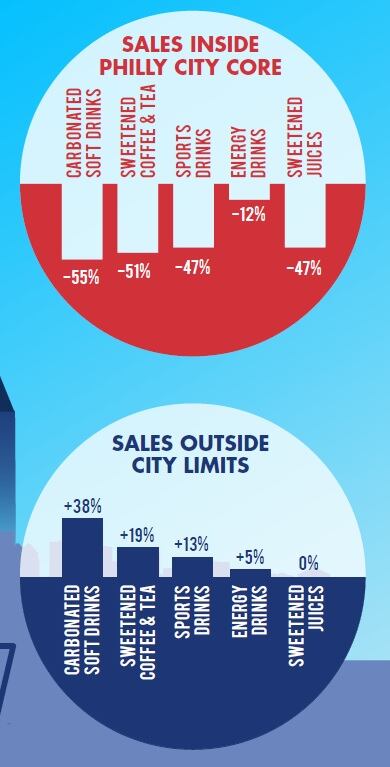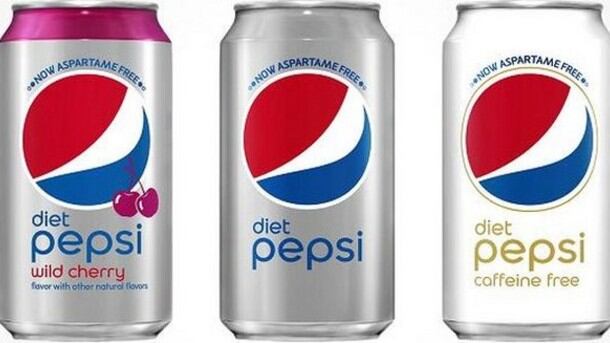The data is from market research firm Catalina, which stated in a new report that it is neutral in its stance on the beverage tax. It analyzed 109 million transactions inside and outside of Philadelphia’s city limits, looking at purchases from 121 stores within city limits, 66 stores just outside the city, and hundreds farther outside of the city in the first five months of 2017 (the tax came into effect on January 1) and compared it with purchases during the same period last year.
The results saw a decline in purchases for some products affected by Philadelphia's sweetened-beverage tax. Carbonated soft drink sales within city limits fell by 55% in the time period, while their sales increased just outside the border by 38%, and by 5% further out.
It was the same story in other categories. Ready-to-drink coffee and tea sales fell by 37% in the city core and 33% within the city border, but increased by 24% outside of city limits. Additionally, sales of refrigerated juice drinks fell by 47% in the city core and 36% within city borders, but were stable just outside the border and jumped by 13% further away from the city.
Sales performance and consumer buying patterns of beverages in Philadelphia have come under national attention as it was the first of major US cities to pass such a tax, providing a benchmark and establishing a historic precedent for legislators and analysts around the country.
A blow to budgets for planned public services?
Mayor Jim Kenney had championed a ‘sweetened beverage tax’ as a revenue source particularly to fund universal pre-kindergarten and other public programs instead of as a health measure, according to Scientific American.
Originally projected to rake in $46.2 million during fiscal year 2017, the tax only brought in $25.6 million for the 1.5-cent-per-ounce tax on sweetened beverages (which included non-caloric sweetener-sweetened beverages) as of June, The Philadelphia Inquirer reported, which meant the city had to collect a whopping $10 million each for the following months for it to meet its goal. The city then lowered its goal to $39.7 million.
Opponents of Philadelphia’ soda tax said that Catalina’s numbers proved that the city’s legislation has not worked. “The mayor pushed this as a revenue generator, but the fact is that at least up to now, the city has never achieved its full collections target,” Anthony Campisi, spokesman for the American Beverage Association-backed coalition Ax the Philly Bev Tax told FoodNavigator-USA.
“We do not accept the industry’s characterization that the beverage tax has ‘underperformed’”
But Mike Dunn, Philadelphia’s deputy communications director, argued against the industry’s characterization that the beverage tax has ‘underperformed.' “In fact, our Fiscal Year 2017 total of $39.4 million was just $300,000 (1%) under our revised projection, and 15% below the original projection of $46 million,” he told FoodNavigator-USA, his number higher than what The Philadelphia Inquirer reported because it included June and preliminary July collection numbers.
“Most independent economists agree that at least 12 months of data are needed to improve the accuracy of any revenue projections,” he added.
He cited Robert Inman, Wharton's Mellon professor of finance and public policy at the University of Pennsylvania, who said that given the lack of historical data for policies like the beverage tax in a city the size of Philadelphia, “85-90% of their projections is ‘pretty good.’”
Dunn added that the nearly $40 million already generated has allowed nearly 2,000 three- and four-year-olds to attend free quality pre-kindergarten, and allowed 4,500 neighborhood public school students to attend community schools.
“In short, the tax is giving new hope to families and communities that are struggling in neighborhoods that have been targeted for years by the beverage industry’s extensive marketing,” he added. “That’s hardly underperforming.”
Causing layoffs in the area
Another point of contention between tax proponents and its opponents is the economic impact.
The sales declines captured by Catalina represent a decline in jobs for the beverage industry, Campisi argued. “The mayor framed it as a ‘pain-free’ way to raise revenue, but this tax has caused the layoff of hundreds of employees throughout the city, mostly in good-paying, blue collar union jobs,” he said
He cited announcements from individual beverage companies, such as Coca-Cola and PepsiCo, both blaming layoffs in bottling and distribution plants due to the tax’s negative impact on sales.

Additionally, Campisi said that retailers are cutting hours and even employees because of this. “I think this study [by Catalina] substantiates why those layoffs are occurring; the drastic decline of sales and total shift in the market, these businesses can’t sustain their previous levels."
However, no independent data has been presented to verify if these potential layoffs “are due to the tax or something else, like automation or loss in regional market share,” Dunn said. Additionally, sales of sweetened beverages, including non-caloric ones, have been in decline nationally, even in places without such taxes.
Dunn also argued that the suburb versus city central divide doesn’t say much as “given the suburbs’ large size, even a small percentage increase in sales there could outweigh the lost sales volume within the city.”
Looking ahead
Philadelphia’s sweetened beverage tax has been controversial from its inception—then-presidential candidate Bernie Sanders dismissed it as ‘regressive’ in an op-ed in Philadelphia Magazine, potentially hurting low-income families disproportionately more. The American Beverage Association has also spent hundreds of millions to fight against the tax.
But the tone from the mayor’s office is that of confidence in the levy as a revenue stream benefiting Philadelphians. “This is a new tax. Any economist will tell you that a tax like the [Philadelphia Beverage Tax’s] monthly collections will vary because of seasonal consumption patterns, variations in due dates, or other variables, like events,” Dunn said.
"We would expect that retail sales would be down in the first few months of the tax because initially people are upset and drive over the city line, but then they do the math and realize the cost of gas or the pure inconvenience doesn’t make it worth it. This occurred with Philadelphia’s liquor and tobacco taxes.
“While opponents of the tax try to spread hysteria and alarm, we are basing our work on the same solid economics that tax professionals across the country employ,” he added. “We remain confident that the beverage tax is and will remain a reliable source of revenue.”

